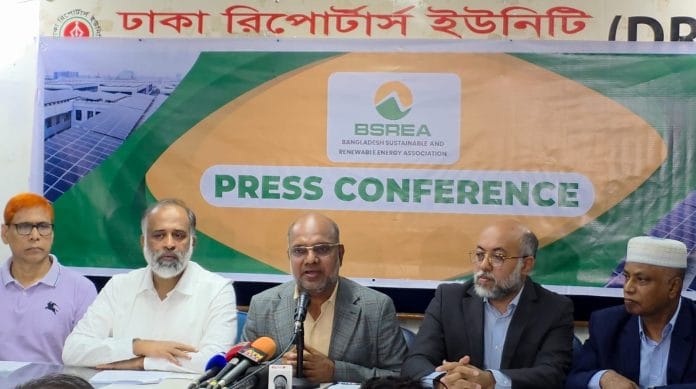Leaders of the Bangladesh Solar and Renewable Energy Association (BSREA) have urged the interim government to reconsider its decision to cancel 37 solar power projects, citing adverse effects on investor confidence and the renewable energy sector.
The cancelled projects, which were issued Letters of Intent (LOIs) under the Special Act for the Power and Energy Sector, had already attracted around $300 million in investment.
Business leaders warned that the abrupt cancellations have discouraged participation in new tenders—evident in the lack of response to 55 newly offered solar projects.
The concerns were raised at a press conference held on Saturday at the Dhaka Reporters Unity (DRU).
BSREA President Md. Mostafa Al Mahmud delivered the written statement, joined by General Secretary Ataur Rahman Sarkar Rozel, Senior Vice President Zahidul Alam, Abu Taher, Sheikh Mohammad Ruhul Amin, and Finance Director Nitai Pada Saha.
The government’s move to invite tenders for 55 new solar projects is a positive step, said Al Mahmud.
“However, we are noticing a serious lack of interest from foreign investors. Some tenders saw only a single bidder, while others drew none. The cancellation of earlier projects has undoubtedly created a negative impression.”
The BSREA’s concerns echo a recent recommendation from the Centre for Policy Dialogue (CPD), which on July 1 urged the government to reconsider its stance and called for improved incentives to attract foreign investment in the renewable energy sector.
Welcoming the recently launched Renewable Energy Policy 2025, BSREA leaders called it a historic milestone for the country’s clean energy transition. They praised the policy’s provision to install solar panels on all government building rooftops, noting that it could bring transformative change to the power sector if properly implemented.
They also appreciated the reduction of import duties on inverters from 10 percent to 1 percent in the national budget, but stressed the need for similar duty cuts on other essential solar components, including mounting structures, DC cables, controllers, batteries, and solar pumps. “High tariffs on these items remain a major hurdle,” they noted, urging the government to establish a more supportive policy framework.
With the country’s natural gas reserves depleting, the business leaders stressed the urgency of scaling up renewable energy, warning that increased dependence on energy imports is putting pressure on foreign currency reserves.
“We need a stable and investment-friendly environment where both domestic and international investors feel confident,” said the BSREA leaders. “Only then can Bangladesh’s renewable energy sector emerge as a reliable investment destination.”
They also highlighted bureaucratic bottlenecks in net metering implementation, pointing to long delays in grid connection approvals. Additionally, they raised concern over the requirement to install at least 1 kW of solar capacity for electricity connections of 10 kW or more, arguing that it conflicts with the Bangladesh National Building Code (BNBC).
Another issue raised was the customs practice of valuing solar panels and related equipment based on weight instead of proforma invoice (PI) value, which they termed “irrational and unrealistic,” often resulting in inflated valuations.
The BSREA presented a set of key demands:
- Exemption from the 7.5% trade VAT on solar panels and equipment
- Tax reduction on lithium-ion batteries
- Publication of a roadmap and guidelines to implement the High Court directive for rooftop solar panel installations
- Measures to prevent the import of substandard solar panels
- Formation of a dedicated cell under the Ministry to ensure rooftop solar compliance, as per court orders
BSREA leaders reiterated their readiness to work in partnership with the government to meet the 2040 renewable energy targets and called for the creation of a transparent and predictable investment environment.

